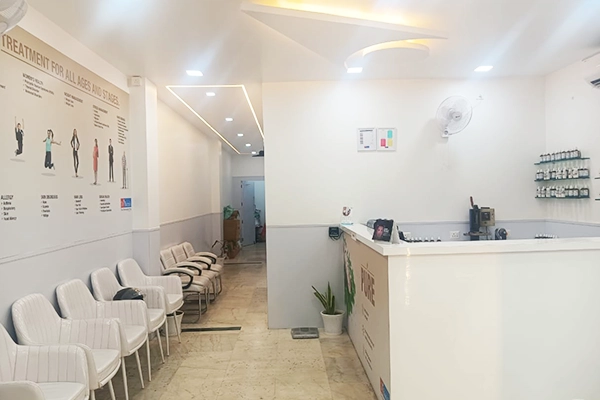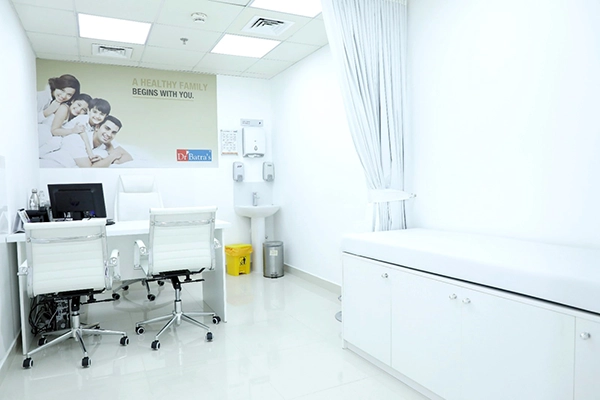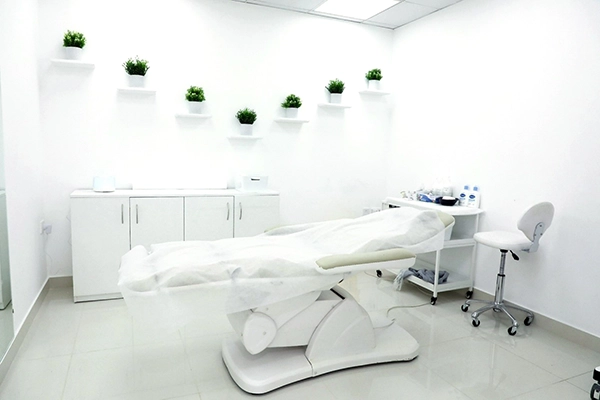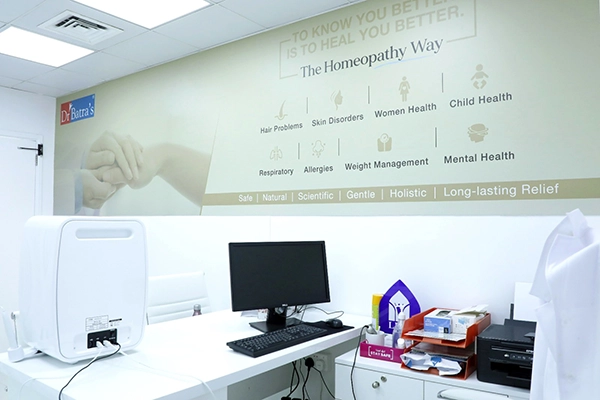Attention Deficit Hyperactivity Disorder (ADHD) Treatment in UAE
Attention Deficit Hyperactivity Disorder (ADHD) is a neurological condition that affects attention, focus, and impulse control. It is one of the most common neurodevelopmental disorders that impacts both children and adults equally. Also known as hyperactivity disorder, it has three primary symptoms: inattention, hyperactivity, and impulsivity.
At Dr Batra's®, we offer safe, effective and personalised homeopathy treatment that helps you manage ADHD symptoms naturally. With decades of expertise under our wing and a patient-centric approach, we are a trusted name for ADHD treatment in the UAE.
Why Choose Homeopathy at Dr Batra's® for ADHD Treatment in Dubai?
We provide the best homeopathy treatment for ADHD. Don’t believe us? Here are some great reasons why you should trust us:
Global Trust and Expertise
We have over four decades of expertise in treating ADHD using homeopathy. During this time, thousands of ADHD patients successfully received treatment as per their individual needs. We are globally known for our holistic treatment plan.
Expert Care and Proven Results
Our specialised doctors possess great experience in managing all types of ADHD symptoms in children and adults. We have many success stories, testimonials and positive outcomes that validate the effectiveness of our natural ADHD treatment approach.
Personalised and Natural Treatment Plans
We understand that ADHD is a spectrum, and not all patients are the same. That’s why we make detailed ADHD diagnoses to provide tailored remedies addressing individual ADHD symptoms and their root causes. All our medicines use gentle and natural remedies with no side effects, making them suitable for all age groups.
Benefits of Homeopathy for ADHD
Homeopathic treatments enhance concentration, reduce hyperactivity, and improve impulse control. As we also treat the root cause of ADHD signs, it helps in providing long-term relief from all attention deficit symptoms.
Homeopathy for ADHD in Adults
We are experts at providing ADHD homeopathic treatment for adults that treats symptoms like disorganisation and impulsivity. Our custom remedies of homeopathy for attention deficit disorder help improve your personal and professional life.
Convenient Locations
Dr Batra's® clinics are easily accessible across Dubai and Abu Dhabi, including:
You can also visit here for more information.
Reviews and Testimonials of ADHD Treatment at Dr Batra’s®
Real success stories from our satisfied patients speak volumes about our expertise. Discover more about the ADHD symptoms and treatment given by our expert doctors:
Significant improvements in behaviour, focus, and impulse control.
Enhanced impulse and reduced dependency on conventional medications.
Positive changes in overall behaviour.
Treatment Process for ADHD at Dr Batra’s® Clinics
If you choose us for your treatment of ADHD symptoms, we will make your experience hassle-free and effective.
Step-by-Step Process
- Initial consultation: Our specialists assess possible ADHD causes and symptoms through in-depth discussions of your past medical history, habits, and family history.
- Diagnosis: Using behavioural assessments and a comprehensive patient history, we diagnose the severity and type of ADHD. Our experts ask you a series of questions that help us fully understand your attention deficit hyperactivity disorder diagnosis.
- Customised solutions: All our homeopathy remedies for ADHD are prescribed according to the patient's unique symptoms. This helps us provide you with life-long management for your ADHD symptoms.
- Regular follow-ups: We regularly monitor treatment progress and also adjust treatment plans if and when indicated. Contact us to book you consultation today!
What is ADHD?
The World Health Organization (WHO) refers to ADHD as a hyperkinetic disorder, and the symptoms and effects can change greatly during a person's lifetime. Here’s a little more on the ADHD disorder:
ADHD Definition and Meaning
Attention deficit hyperactivity disorder definition is in the name. So, simply stated, ADHD is a neurodevelopmental disorder where there are two types of behavioural issues. These are inattentiveness, which causes difficulty in focusing or concentrating, and hyperactivity, leading to impulsiveness.
Types of ADHD
● Inattentive Type:
This type of attention deficit disease is characterised by difficulty in focusing, poor organising skills, and forgetfulness. These types of people often get bored quickly, don’t listen, move slowly, daydream extensively, and have trouble following directions.
● Hyperactive-Impulsive Type:
In this type of attention hyperactivity disorder, the person often fidgets, interrupts others, and has excessive energy. They are constantly on the go, don’t think about the consequences of their actions, are impatient, and talk constantly.
● Combined Type:
These people display symptoms of attention deficit hyperactivity disorder of both inattentive and hyperactive-impulsive types. They don’t exclusively fall in either of the above ADHD categories.
Symptoms of ADHD
The ADHD symptoms in adults search results and symptoms of attention deficit disorder in children are a little different. Let’s find out how they present in each of the age groups:
Common Symptoms in Children
ADHD symptoms in kids are a little difficult to diagnose as they often appear as kids being kids.
- Difficulty paying attention, restlessness, and excessive talking
- Forgetfulness and poor academic performance.
- Hyperactivity, impulsiveness, and frequent interruptions.
- Mood swings and difficulty in falling asleep.
Common Symptoms of ADHD in Adults
The signs of attention deficit hyperactivity disorder change a little when a person ages.
- Chronic disorganization, difficulty managing time, and impulsivity
- Frequent bouts of hyperfocus while having a negative self-image
- Trouble meeting professional demands and maintaining relationships
Causes of ADHD
We have enlisted some of the common causes of attention deficit hyperactivity disorder.
Genetic Factors
- ADHD generally runs in families, indicating a strong genetic predisposition
- Any other related neurodevelopmental disorders in the family can also be one of the attention deficit hyperactivity disorder causes
Environmental Factors
- Prenatal exposure to alcohol, tobacco, or toxins
- Early exposure to lead or other harmful substances like narcotics or second-hand smoke can also be one of the causes of ADHD
- Premature birth or brain injury at a young age
Impact of ADHD on Daily Life
In Children:
- The child struggles with academics and forming friendships.
- Difficulty participating in structured activities.
In Adults:
- They face challenges in managing job responsibilities and maintaining stable relationships.
- Higher risk of low esteem and emotional distress.
- To know more about ADHD in adults, click here.
Lifestyle Tips for Managing ADHD
Routines and Schedules
It is important to establish a consistent daily routine to improve focus and reduce distractions, not just as an adult but also to manage symptoms in children.
Diet and Nutrition
Avoiding processed foods and eating a well-balanced diet for kids and adults rich in brain-boosting nutrients like omega-3 fatty acids and certain minerals is very important. Consuming special natural herbal remedies and a good diet can also help calm down the symptoms.
Stress Management
As it is a hyperactivity disorder, it’s important to keep your brain calm by encouraging physical activities like yoga and meditation.
Book your Appointment for ADHD Treatment
FAQs
What is ADHD, and how is it diagnosed?
ADHD is a neurodevelopmental disorder where the person is inattentive and hyperactive. It is diagnosed through behavioural assessment and detailed patient history.
Can ADHD be cured with homeopathy?
While ADHD cannot be cured, homeopathy effectively manages symptoms and provides long-term relief. As homeopathy focuses on holistic treatment plans, it becomes much easier to live a normal life with homeopathic natural and non-invasive remedies.
What are the early signs of ADHD in children?
Children often show both types of ADHD behavioural changes: inattentiveness and hyperactivity. Thus, the ADHD signs include difficulty in focusing, restlessness, impulsiveness, fidgeting, a talkative nature, easily unimpressed with activities, and an inability to make friends.
How long does homeopathic treatment for ADHD take?
The treatment highly depends on the type, ADHD reasons, and severity of the ADHD symptoms, but on average, it will take around 6-12 months to see the difference.
Are homeopathic remedies safe for managing ADHD symptoms in kids?
Yes, the attention deficit hyperactivity disorder treatments in homeopathy are natural and free from side effects, making them safe for children.
What lifestyle changes can help reduce ADHD hyperactivity disorder symptoms?
The most important lifestyle change should be establishing routines. This helps in focussing and forming useful habits while calming the mind. Additionally, maintaining a healthy diet, and practising stress management exercises are always beneficial.









